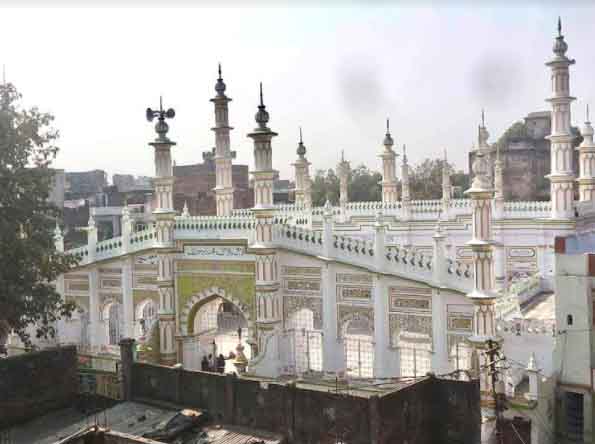- 0631-7960331
- +91 943 145 3353
- jmbpsccc@gmail.com


Vision
Empowering the youths of the Minority to become Intellectually Competent and Live with Dignity through Educational Guidance and Coaching.
Mission
Minorities especially Muslims are the most socially, economically and educationally backward and under privileged community of our country. So, the Jama Masjid Committee, Gaya has initiated with Academic Guidance Programme through the BPSC Coaching Centre at Shahid Road Gaya, approved by Bihar State Sunni Waqf Board, Patna and enable the deserving Muslim students achieve success by providing free coaching, educational support, and library facilities to the Civil Services aspirants.
JAMA MASJID at a Glance
The construction of the Jama Masjid at Gaya began in 1657 and was completed in 1661. The existing Jama Masjid in Gaya is built on a 90 feet wide, 130 feet long and 7 feet high platform. Three thousand people can offer Namaz at once in its premises. This Jama Masjid also has a Wazukhana 30 feet long, 14 feet wide and 6 feet deep, with a fountain in the middle use for ablutions. The Jama Masjid has a spacious hall for prayers. In this, the Imam recites the Qutba on the Mimbar under the Mihrab. Gaya's Jama Masjid is considered the biggest and prosperous in the province, under which there are 20 buildings and commercial premises.
There is a Committee for the operation of the Mosque and its ally units. The Mosque committee also manages an Aangan Badi Kendra and Maktab for children of surroundings, and Community Hall and JAMA MASJID BPSC COACHING CENTRE.
In the Maktab almost 50 Muslim children of poor backgrounds are enrolled to learn mainly for the recitation of holy book Qu'ran(Tilawat) and offering Five time prayers (Namaz). Qur'an recitation; reading, writing, and grammar of Urdu are the focussed area in the Maktab, which are the only means of mass education. The Committee bears all expenses incurred on their education. The Quran gives stress on the removal of ignorance which was regarded as the prerequisite of the Islamic faith. "It is a religious duty to acquire knowledge which is a friend, guide and benefactor in this world and in the other world."

BPSC Course Details
The Bihar PSC is a constitutional body under Article 315 of the Indian Constitution. The BPSC came into existence in 1949 after its separation from the Orissa and Madhya Pradesh commissions. It is mandated to assist the state government in matters of recruitment, transfers and disciplinary actions. BPSC stands for the Bihar Public Service Commission. The BPSC conducts recruitment exams to fill Group A, B, C posts in the state administration of Bihar. Among the various exams, the Combined Competitive Exam (CCE) is one of the most prestigious and tough exams. Via the CCE, the BPSC recruits for about 20 posts and services.
The BPSC Exam is held in three stages
-
1. Prelims - 1
objective type paper for 150 marks
-
2. Mains - 5 descriptive papers
i. General Studies - Paper l (300 Marks)
ii. General Studies - Paper ll (300Marks)
iii. Essay - Paper lll (300 Marks)
iv. Hindi. - (100 Marks; qualifying)
v. Optional paper - (100 Marks; qualifying)
BPSC (PT) Syllabus
The paper on General Studies will include questions covering the following fields of knowledge:
General Science, Current events of national and international importance. History of India and salient features of the history of Bihar. General Geography and geographical division of Bihar and its major river systems. Indian Polity and Economy and major changes in the economy of Bihar in the post-independence period. Indian National Movement and the part played by Bihar in it and also Questions on Mathematics and Mental Ability. Questions on General Science will cover general appreciation and under-standing of science, including matters of everyday observation and experience, as may be expected of a well-educated person who has not made a special study of any scientific discipline. In History, emphasis will be on broad general under-standing of the subject in its social, economic, and political aspects. The candidates are expected to be familiar with the broad aspects of the history of Bihar. In Geography, emphasis will be on geography of India and Bihar. Questions on the Geography of India and Bihar will relate to physical, social, and economic Geography of the country including the main features of Indian agricultural and natural resources. Questions of Indian Polity and Economy will test knowledge on the country's political system, Constitution of India, Panchayati raj, Community Development, Economic planning and Budget in India and Bihar. Question on the Indian National Movement will relate to the nature and character of the nineteenth century resurgence, growth of nationalism and attainment of Independence and candidates will be expected to answer questions on the role of Bihar in the freedom movement of India.

